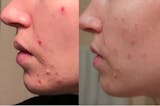Allergies occur when the immune system misidentifies a harmless substance (allergen) as a pathogen and attacks it.
Intolerances result from the body's inability to properly process certain substances.
Both can cause eczema flares. Learn how to identify which allergies and intolerances may be affecting your eczema.
Eczema is a chronic skin condition characterized by periodic acute flares, marked by red, itchy, and inflamed skin. It is believed to be caused by a combination of genetic, environmental, and immunological factors.
The severity and duration of an acute flare is a product of three main factors:
Skin barrier strength: affecting the permeability of the skin, how strong it is and how quickly it can heal
Immune system sensitivity: affecting the aggressiveness of the immune system, how quickly it reacts, and how quickly it shuts down a reaction
Triggers: something the body has an immune reaction to
In this article, we will delve into the role that allergies and intolerances play in eczema and provide insights into managing these aspects of your health to better control your eczema flares.
JUMP TO SECTION:
Understanding Allergies
The immune system is a complex and sophisticated system that is designed to defend the body against foreign substances and dispose of pathogens to keep you alive and healthy.
In some cases, the immune system has falsely learned that a harmless substance is a pathogen and attacks it with vigor.(DAV 2011) This unnecessary response is called an allergy and the generally harmless substance is called an allergen.(ALL 2023)
Type of Allergic Reactions
Allergic reactions can be classified into four main types, based on the immune response involved. These are known as Type I, Type II, Type III, and Type IV hypersensitivity reactions.
- Type I (Immediate) Hypersensitivity Reactions: These reactions involve the release of histamine and other inflammatory substances from mast cells and basophils. Examples include allergies to pollen, animal dander, insect venom, and certain foods.
- Type II (Antibody-Mediated) Hypersensitivity Reactions: These reactions involve IgG or IgM antibodies binding to antigens on the surface of cells, leading to cell damage or destruction. Type II reactions are typically associated with autoimmune disorders and are not directly implicated in eczema.
- Type III (Immune Complex-Mediated) Hypersensitivity Reactions: These reactions are caused by the formation of immune complexes, which are aggregates of antigens and antibodies. When deposited in tissues, these complexes can trigger inflammation and tissue damage. Type III reactions are more commonly associated with conditions like lupus and rheumatoid arthritis and are not directly implicated in eczema.
- Type IV (Delayed or Cell-Mediated) Hypersensitivity Reactions: These reactions are mediated by T cells rather than antibodies and involve the activation of immune cells, which can cause local inflammation and tissue damage. Contact dermatitis, which is caused by an allergic reaction to substances like nickel, poison ivy, or certain chemicals, is an example of a Type IV reaction. Although contact dermatitis is a distinct condition from atopic dermatitis, people with atopic dermatitis can have an increased susceptibility to contact dermatitis. In such cases, a Type IV reaction may exacerbate the symptoms of eczema.
Type I and Type IV reactions are involved in eczema. Type I reactions are felt almost immediately while Type IV reactions are delayed, making it more difficult to track down the trigger.
What Are The Effects of Allergies on Eczema?
Allergies and intolerances can trigger and exacerbate eczema symptoms, with the severity of these symptoms varying between individuals. The intensity and duration of an eczema flare-up are influenced by three main factors:
Skin barrier strength
Immune system activation
The amount of environmental triggers present
A weakened skin barrier allows lower amounts of an allergen to trigger a flare-up and for flare-ups to be more intense of an equal amount of allergen. The flare-up lasts longer with a weaker skin barrier due to the skin's slower repair process compared to someone with a stronger skin barrier.
Similarly, an overactive immune system intensifies a flare-up and prolongs its duration, even when the allergen amount is the same as that in someone without an overactive immune system. Understanding these factors helps to manage eczema symptoms more effectively.
Common Allergens and Eczema
Allergies occur when the body reacts inappropriately to generally harmless substances. These reactions are learned and, as a result, differ from one person to another.
The following sections contain potential allergens to which some individuals might react, while others may not. Nonetheless, if you are attempting to identify your trigger, these common allergens are a good starting point for devising a plan to assess your personal sensitivity.
Environmental Allergens and Eczema
Some common environmental allergens include:
Dust mites: Microscopic organisms that live in household dust.
Pollen: Fine powdery grains released by plants for reproduction.
Mold: Fungi that release spores into the air.
Pet dander: Tiny particles of skin and hair from pets.
Household Allergens and Eczema
Household cleaning agents, including laundry detergents and fabric softeners, contain ingredients intended to break down and separate organic molecules. These same ingredients can also act as potential allergens or irritants for individuals with sensitive skin or eczema. For instance:
- Laundry detergents: Some detergents include enzymes like protease, amylase, and lipase, which may trigger skin reactions in those with sensitivities.
- Fabric softeners: These products may contain quaternary ammonium compounds (quats) that can cause contact dermatitis in susceptible individuals.
Being aware of these potential sources of allergens can help minimize the risk of eczema flare-ups.
Fragrance Allergens and Eczema
Your nose reacts to (e.g “smells”) scents in the world. Those scents are made up of volatile organic compounds.
Volatile organic compounds are natural or synthetic ingredients that may trigger an allergic reaction or irritate the skin.
In particular, fragrance chemicals such as limonene, linalool, and geraniol are known to cause skin reactions in sensitive individuals.
Look for fragrances in cleaning products and personal care products and be mindful of scents emanating from sources like barbecues, candles, and cooking, as they may contain irritants that aggravate eczema symptoms.
Preservative Allergens and Eczema
Where there is water, there is microbial growth, which can lead to allergic reactions or infections. As a result, manufacturers typically add preservatives to slow down or halt microbial growth.
Traditional preservatives, such as sugar, alcohol, and salt, require relatively high concentrations in the final product to be effective. However, scientists have discovered preservatives that function in smaller quantities, allowing for a higher proportion of functional ingredients in the end product.
Individuals may develop sensitivities to these preservatives.
Formaldehyde, methylisothiazolinone (MI), and parabens, are preservatives that can cause skin irritation, inflammation, and allergic contact dermatitis. They may also cause cross-reactivity with other chemically similar substances.
Colorant Allergens and Eczema
Colorants, comprising synthetic dyes and pigments, are often added to personal care and household products to enhance their visual appeal. However, some individuals may have sensitivities to these colorants, leading to skin reactions or allergic responses.
Examples of synthetic colorants known to cause allergic reactions include P-phenylenediamine (PPD) found in hair dyes and disperse dyes used in textiles. In addition, though less common, natural colorants such as henna or annatto can also provoke allergic reactions in some people.
Dietary Allergens and Eczema
Certain foods are well-known culprits for triggering allergies including:
Dairy
Nuts (especially peanuts)
Soy
Shellfish
The effects of these allergens on individuals can vary, depending on factors such as seasonality, environment, and genetic predisposition.
A weakened skin barrier may allow dietary allergens to penetrate the skin, initiating a direct reaction on the skin surface.
Identifying Your Allergens
Minimizing eczema symptoms often involves identifying any allergies that may be contributing to your flare-ups. You can take the following steps to pinpoint potential allergens:
- Keep a symptom diary: Record your daily activities, food intake, and exposure to potential allergens, along with any corresponding symptoms. This will help you identify patterns and triggers related to your eczema.
- Allergy testing: Consult with a healthcare professional or allergist who can perform allergy tests to help determine specific allergens causing your eczema flare-ups. Tests may include skin prick tests, patch tests, or blood tests to assess your immune system's response to specific substances.
- Experimenting: Engage in an elimination diet or make lifestyle changes that may remove exposure to allergens. By systematically eliminating and reintroducing potential allergens while maintaining a diary, you can more effectively identify the allergens affecting you (if any).
By identifying and managing your exposure to allergens, you can better control your eczema symptoms and reduce the frequency and severity of flare-ups.
Managing Allergens & Eczema
Eczema symptoms are a product of:
The amount of environmental triggers present
Skin barrier strength
Immune system activation
By addressing each these three factors, you can better manage your eczema symptoms. Here are some steps to consider:
Managing The Amount of Allergens Present
Maintain a clean environment: Regularly clean your living space to reduce the presence of allergens like dust mites, pet dander, and mold. This may involve frequent vacuuming, dusting, and using air purifiers to improve indoor air quality.
Use hypoallergenic products: Opt for skincare products, laundry detergents, and household cleaners that are free of your known allergens or formulated specifically for sensitive skin.
Managing Allergens Getting Through
- Moisturize regularly: Apply emollients or moisturizers daily to help repair the skin barrier and alleviate dryness and itching. Look for products designed for sensitive skin and free from known allergens.
Adjust your diet: Based on allergy and intolerance testing results, modify your diet to avoid trigger foods. Work with a registered dietitian or nutritionist to create a balanced diet that supports your overall health while eliminating allergens.
Managing Immune Reaction to Allergens
- Reduce stress: Engage in stress management techniques such as meditation, exercise, or deep breathing exercises. By lowering stress levels, you can help decrease immune system reactivity and reduce inflammation
- Adopt a low-inflammation diet: Consume foods rich in anti-inflammatory properties, such as fruits, vegetables, whole grains, and omega-3 fatty acids. Avoiding inflammatory foods, like processed items or those high in refined sugar, can further support your immune system and reduce eczema symptoms.
Intolerances and Eczema
Intolerances, also known as non-allergic hypersensitivities, are adverse reactions to specific substances or ingredients that occur without the involvement of the immune system. In contrast, allergies are immune-mediated reactions to substances that are typically harmless for most people. While both intolerances and allergies can lead to uncomfortable symptoms, their underlying causes and mechanisms differ.
Intolerances typically result from the body's inability to properly digest, absorb, or process a particular substance. Common examples include lactose intolerance, where an individual lacks the enzyme lactase to break down lactose found in dairy products, or gluten sensitivity, where the body has difficulty processing gluten found in wheat and other grains.
Intolerances can cause a range of gastrointestinal symptoms, such as bloating, gas, and diarrhea, but may also result in skin issues like eczema flare-ups in some individuals.
What Are The Effects of Intolerances on Eczema?
Intolerances can exacerbate eczema symptoms by causing additional inflammation in the body and, at times, directly affecting the skin. When the immune system is activated due to an intolerance, it can amplify the skin's reaction to a trigger, even if the trigger level was previously tolerable without causing a flare-up. This heightened sensitivity can lead to more frequent or severe eczema flare-ups.
The severity and specific symptoms of eczema can vary from person to person, depending on each individual's sensitivity to particular intolerances. In some cases, managing intolerances through dietary and lifestyle changes can significantly improve eczema symptoms, while others may require additional treatment or intervention to achieve optimal results.
Common Intolerances and Eczema
Common intolerances that can contribute to eczema include:
Lactose intolerance: Occurs when the body lacks sufficient lactase, the enzyme required to break down lactose, a sugar found in dairy products. This can lead to gastrointestinal symptoms and increased immune activity.
Gluten intolerance: A sensitivity to gluten, a protein found in wheat, barley, and rye. For some individuals, consuming gluten can cause gastrointestinal symptoms increased immune activity.
Intolerances With a Weak Skin Barrier
While intolerances are generally associated with digestion, a weak skin barrier can allow substances to pass through the skin and into the body, where they can act as irritants.
Preparing food, even if not consumed, can cause someone with an intolerance to experience an eczema flare.
Irritating Fabrics and Eczema
Some people with eczema may be intolerant or sensitive to specific fabrics, such as wool or synthetic materials. These fabrics can cause friction or irritation on the skin, leading to discomfort and potentially triggering or worsening eczema symptoms. Opting for soft, breathable, and natural fabrics like cotton can help reduce irritation and promote overall skin health for individuals with eczema.
Identifying Your Intolerances & Managing Them
Diagnosing and managing intolerances typically involves the following steps:
Keep a food diary: Record everything you eat and any symptoms experienced to help identify potential triggers.
Elimination diet: Remove the suspected trigger food from your diet for a period of time (usually 2-4 weeks) and monitor your symptoms. If symptoms improve, the trigger food may be reintroduced to see if they return.
Consult a healthcare professional: If you suspect an intolerance, consult with a healthcare professional for guidance on diagnosis and management.
Managing intolerances involves avoiding or limiting intake of the offending substances, which can help reduce eczema flare-ups and improve overall skin health.
Managing Intolerances & Eczema
Effectively managing your intolerances can play a crucial role in controlling eczema symptoms and improving your overall skin health. Here are some strategies to help you navigate through the challenges posed by intolerances and maintain healthier skin:
- Adjusting your diet: Based on intolerance testing results, modify your diet to avoid trigger foods. This can help minimize the impact of intolerances on your eczema symptoms.
- Reducing stress: Engage in stress management techniques such as meditation, exercise, or deep breathing exercises to lower immune reactivity, which can help alleviate eczema flare-ups triggered by intolerances.
- Low Inflammation Diet: Incorporate anti-inflammatory foods into your diet, such as fruits, vegetables, whole grains, and lean proteins. This can help support your body's natural healing process and decrease the severity of eczema symptoms.
By identifying and managing your intolerances, you can take a proactive approach to reduce eczema flare-ups and improve your overall skin health.
The Role of Genetics in Eczema and Allergies
Genetics plays a significant role in the development of eczema and an individual's susceptibility to allergies and intolerances. Research has shown that eczema is strongly linked to genetic factors, particularly the loss-of-function mutations in the filaggrin gene. Filaggrin is a crucial protein for maintaining the skin's barrier function, and a deficiency can lead to a compromised skin barrier, making it more susceptible to allergens and irritants.
In addition to genetic predisposition to eczema, some individuals may inherit a genetic predisposition to allergies and intolerances. Allergic diseases like asthma, hay fever, and food allergies tend to run in families, suggesting a strong genetic component.
The Atopic Triad
The term "atopic triad" refers to the combination of three related allergic conditions: eczema, allergic rhinitis (hay fever), and asthma. Many individuals with eczema also suffer from one or both of these other conditions, highlighting the interconnected nature of these diseases.
Research suggests that the genetic factors that contribute to eczema may also play a role in the development of other atopic conditions.
Managing eczema in the context of the atopic triad may require a more holistic approach to treatment, taking into consideration the potential impact of other atopic conditions on eczema symptoms and the need for a coordinated management plan.
The Importance of a Comprehensive Management Plan
Given the complex nature of eczema and its relationship with allergies and intolerances, it is crucial to develop a comprehensive management plan that addresses all contributing factors. This may involve:
Regular visits with a healthcare professional: Consulting with a dermatologist, allergist, or primary care physician to monitor your eczema symptoms, discuss treatment options, and adjust your management plan as needed.
Collaboration with other specialists: Depending on your specific needs, you may benefit from working with other healthcare professionals, such as a dietitian or a mental health professional, to address various aspects of your eczema management.
Personalized treatment: Tailoring your treatment plan to your specific triggers, allergies, and intolerances, as well as other factors that contribute to your eczema, will help optimize symptom control.
Continual education: Staying informed about the latest research and treatments in eczema management can help you make the best decisions for your skin health.
Affected by Allergies or Intolerances?
In summary, allergies and intolerances can play a significant role in eczema, impacting both the frequency and severity of flare-ups. Identifying and managing these triggers through allergy and intolerance testing can help you tailor your lifestyle for better eczema symptom control.
It is crucial to remember that eczema is a multifactorial condition, and allergies and intolerances are just some of the many factors that can contribute to its development and exacerbation.
We encourage you to explore other factors and treatments by engaging with our other content, as a comprehensive approach is key to effectively managing this complex skin condition.
Share your experiences with us! Tell us what has and hasn’t worked for you. What did we miss in this article that you’ve found personally impactful?



